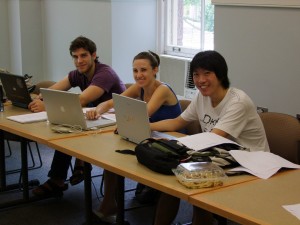
Students work during an REU session.
For students whose idea of a fun summer involves working on unsolved problems in mathematics, Lafayette’s Research Experiences for Undergraduates (REU) program is just the ticket.
This summer, the program will bring together eight students from Lafayette and other top colleges and universities around the United States for an intensive, eight-week research experience of working in small groups directed by individual faculty members. And they will most likely have the time of their lives.
“Taking part in the REU program was a terrific way to get exposure to some real applications of math while also giving us a chance to learn some different fields in math and challenge ourselves to discover some theorems and proofs all on our own,” says math graduate Michael Follett ’11, who took part in the program for two summers.
Lafayette has one of the oldest REU programs in the country. Hundreds of students have participated since 1992, with most going on to graduate school, teaching jobs, or work in various industries. Participants receive free housing and a $3,200 stipend through funding from the National Science Foundation.
Each team collaborates on a research paper, which often results in publication in professional journals and presentations at national mathematics conferences.
Follett credits the REU program with directly jump starting his career. While presenting research at the 2009 Joint Mathematics Meetings in Washington, D.C., he met a government representative and began the application process that eventually led to his current job as a cryptologic computer scientist with the Department of Defense.
“With each job that I applied for, a bulk of my interviews were spent discussing the research that we did and the experience that was gained along the way,” Follet says.
The program is being led this year by Qin Lu, associate professor of mathematics, and Ethan Berkove, associate professor of mathematics. There have been 158 applications for this summer.
“It’s a pleasure to watch students gain mastery over a challenging problem. Although eight weeks goes by quickly, students often develop a great deal during that time,” Berkove says.
Three research groups will study problems in geometry, financial mathematics, and number theory. Kevin Harshorn of Moravian College will lead a team that will study folding and unfolding polyhedra. Lu’s project is on risk-adjusted returns in stochastic volatility models, and Cliff Reiter, professor of mathematics, is conducting research on perfect parallelepipeds.
Lu points to four components that make the program a success: dedicated faculty mentors, excellent students, teamwork, and good social activities.
“Students spend eight weeks in an intensive research environment. In addition to learning a lot of mathematics, they learn about how the mathematical community works through outside speakers and other events. In that way, the program is an opportunity to see what mathematicians do,” Berkove says.
When he participated in an REU in 2009, Adam Biesenbach, a 2010 graduate of the University of Rochester, was part of a group that researched collateralized debt obligations, which played a pivotal role in the financial crisis that began in 2007.
His team’s work was published in the Journal of Structured Finance in 2011, and he credits the program with leading to his job as an assistant economist in the research department at the Federal Reserve Bank of New York.
“The program gave me invaluable experience with the research process, from early stages of paper reading all the way to publication. But REU wasn’t all work—all the undergraduates had a great time and became close friends over the course of the summer,” Biesenbach says.
In keeping with the goal of having fun, each summer features activities that do not have a mathematical goal. Past activities have included sightseeing, hiking, climbing on the rock wall in Kirby Sports Center, rafting on the Delaware River, and seeing the play Proof in New York City. The program also organizes cookouts, DVD nights, and guest speakers, and allows students to plan their own activities.
Previous program directors, Reiter and Gary Gordon, professor of mathematics, developed a balance between social activities and academics.
“They worked hard to encourage a strong sense of community among the program participants, and to make sure that the summer program is fun in addition to being mathematically rewarding. Professor Lu and I hope to continue the program in that vein,” Berkove says.

1 Comment
The student/teacher relationship has always been a priority and hallmark of the College. That is a great thing. My professors worked diligently with the honors thesis students, but Dick Faas always had time for me, a late-comer to the geology program. We took a field trip, together, one August to a gravel pit where the professor was using the gravel washing machinery to study the sorting and distribution of sand and mud. The sand dropped out, first. The mud drifted farther before settling in a rubbery and bouncing mat.
This impromptu trip showed me that I could discover informative settings like the gravel pit, where I could examine processes of nature. Discovery sometimes depends on where you look. Dr. Faas is retired, living in Mississippi. He lived through Hurricane Katrina and had a lot to share with me about the storm intensity and the destructive power of the storm surge. All of this is what being Lafayette Students and Professors is all about!
Comments are closed.